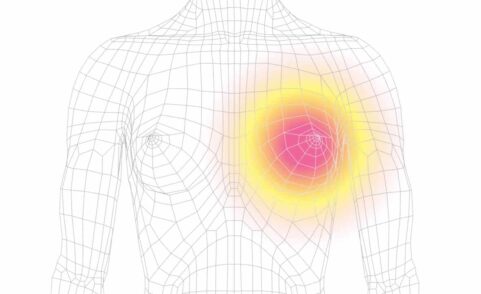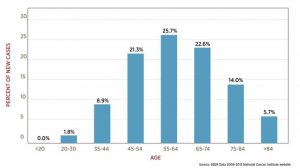
Managing Your Breast Cancer Risk
Posted In: Breast Imaging
After 22 years of clear mammograms and seven months after her latest, Jane Moore was diagnosed with breast cancer. She was 65 years old. “My mission became to let my friends and family know and tell people my story,” Jane explains. “As you get older, your risk is increasing.” Jane isn’t alone. Many women have clear mammograms for decades and, seemingly out of the blue, breast cancer is detected.
As a woman ages, her risk of developing breast cancer increases. Each year 21 percent of women diagnosed with breast cancer are between the ages of 45 and 54. This jumps to 25.7 percent for women ages 55 to 64. Today’s baby boomer women are actually at the highest risk of breast cancer of all 40+ women. This is why stories like Jane’s story are so important, serving as a reminder not to abandon the routine after a few decades. Dr. Paula George, a breast radiologist at RAYUS, says it’s not uncommon to see a woman in her 80’s to get her annual screening. For women of the baby boomer generation (born between 1946 and 1965), your risk is still greater for developing breast cancer than women in their mid-40’s and early 50’s.

The American College of Radiology and the Society of Breast Imaging recommends yearly mammograms starting at age 40. To find out more about changing mammogram guidelines, watch this video. “What’s interesting is that there’s not an actual end date to the recommendation,” says Dr. George.
Breast cancer screening is meant to catch cancer early, when it is small and when there are several treatment options. That’s why annual mammograms are so important. “If breast cancer is caught early enough in a 74-year-old woman, her treatment options are wide open,” says RAYUS Breast Radiologist Dr. Julie Sullivan. “She can have a smaller surgery, she has better treatment outcomes, versus waiting until it becomes a palpable lump and something that needs to be dealt with in a more invasive way or in a way that she could not tolerate at that point in her life.”
At RAYUS, our breast health experts recommend that a woman continue to get screening mammograms into her 70’s and 80’s on a yearly basis. Your stopping point is a personal decision. It is very important to have these conversations with your physician. For each woman, risk factors like family history, genetics, and life expectancy need to be considered.
So how do you decide when to stop screening? Consider these two variables: life expectancy and willingness to treat the cancer. “If you are a 70-year old or 80-year old otherwise healthy woman who would act upon breast cancer, a mammogram is absolutely for you,” advises Dr. Sullivan. When she says, “act,” she means you will consider the treatment options that come with your diagnosis and pick the best for you.
It is important to approach breast cancer screening on a customized, individual basis. As this article from breastcancer.org points out, there are 80-year-olds with life expectancies of 15 or 20 years and 60-year-olds likely only to live another year or two. So the relationship between your age and life expectancy is not always clear-cut.
If you have a life expectancy that is less than 10 years, you probably don’t need a screening mammogram, but a woman can still have one if she chooses, says Dr. George. “I had a woman the other day, she’s 95. She’s had breast cancer and she wants to continue screening mammograms and it’s still covered for her.” All women over the age of 40 who are covered by Medicare are covered for screening mammography. You don’t age out of mammogram coverage.
For Jane, her breast cancer diagnosis at age 65 seemed surreal. It made her appreciate the importance of mammograms and self-checks. As she went through her breast cancer treatment, she came back to RAYUS for imaging and now returns for her annual checks because of what she calls compassionate care. “I trust them,” Jane says. “They care about me and I feel that they also empower women in their own health.”
In the two years since her diagnosis, Jane’s been empowered to spread the word. She says it’s her mission to remind all her friends to stick to the annual mammo routine. “Based on my own personal experience, not getting a yearly screening mammogram is not a risk I’d be willing to take. If you’re that one in a million person, it could mean your life.” Take your breast health into your own hands – schedule your screening mammogram today.